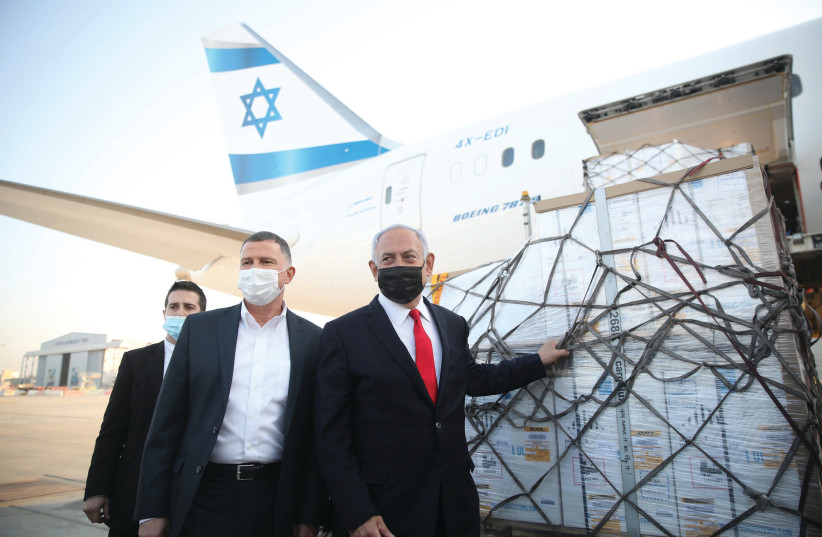Senior Pfizer officials said they were concerned that the transitional government would not pay and the company did not want to be exploited. They said they do not understand how such a situation can occur in an organized country.
Army Radio reported that Pfizer called Israel a “banana republic”.
A shipment of 700,000 doses was expected to arrive in Israel on Sunday, but was postponed until further notice.
Pfizer told the Post that the company completed all deliveries to Israel under its initial agreement to supply its COVID-19 vaccine, signed in November 2020.
“The company is currently working with the Israeli government to update the agreement, to provide additional vaccines to the country. As long as this work continues, shipments can be adjusted,” the company said in a statement.
The Ministry of Health declined to comment.
cnxps.cmd.push (function () {cnxps ({playerId: ’36af7c51-0caf-4741-9824-2c941fc6c17b’}). render (‘4c4d856e0e6f4e3d808bbc1715e132f6’);});
if (window.location.pathname.indexOf (“656089”)! = -1) {console.log (“hedva connatix”); document.getElementsByClassName (“divConnatix”)[0].style.display = “none”;}
The Post was told that the government never paid for the last 2.5 million.
So far, Israel has spent NIS 2.6 billion on coronavirus vaccines, it was revealed last month at a meeting of the Knesset Finance Committee. In general, the government does not discuss the cost of vaccines because of confidentiality agreements with companies. Israel is known to have paid much more per dose than any other country.
The Ministry of Health had been lobbying the government to approve the purchase of an additional 3.5 billion NIS – more than 30 million vaccines – before Easter and the government met last Monday. However, the meeting was postponed indefinitely due to a conflict between Netanyahu and Alternate Prime Minister Benny Gantz.
Gantz canceled the meeting because of Netanyahu’s refusal to approve the permanent appointment of a justice minister. His term as interim Minister of Justice ended on April 2, three months after taking over from Avi Nissenkorn, who had resigned.
The permanent appointment has not yet been made.
HEALTH MINISTER Yuli Edelstein spoke to Gantz on Sunday night to try to persuade him of the importance of moving forward with payment and purchase.
A spokeswoman for Gantz told the Post that “although the prime minister has done much to undermine the functioning of the government,” the alternative prime minister “will do nothing to affect the health of the people of Israel by denying vaccines”.
However, sources at Gantz’s office emphasized that if this meeting is so urgent for Edelstein “all he needs to do is call PM Netanyahu and ask him to appoint a minister of justice”.
The Gantz office also said that the purchase of the 2.5 million vaccines has already been approved and that the possible delay in payment was due to the Ministry of Health.
The source said the country has already purchased 27 million doses – which includes the Pfizer, Moderna and AstraZeneca vaccines – “which should suffice for the near future”. The source said that purchasing additional vaccines requires due process and deliberation.
Meanwhile, health officials are concerned that Israel will miss the opportunity to buy vaccines, which are sought after by countries around the world.
Coronavirus commissioner, Prof. Nachman Ash told the Post that if Israel does not sign the necessary contracts quickly, it may not be able to vaccinate its children or provide citizens with booster doses against vaccine-resistant variants, or if immunity decreases.
“There is a real competition to buy vaccines from countries around the world,” Ash said in an interview last week. “We want to reserve our place at the top of the list and not be pushed to the end so that we cannot get them [vaccines] when they are most needed. “
PFIZER ANNOUNCED that its vaccine was safe and effective against the virus for children in this age group and is now seeking FDA approval. Health Ministry Director-General Chezy Levy said over the weekend that Israeli teenagers could be vaccinated as early as May.
The vaccination campaign allowed Israel to open its economy last month, including sending more children back to school on Monday.
The Ministry of Health has agreed to allow third grade children to learn without the capsules. Older students still use capsules, which means they are not yet able to go to school full time.
Ash told Ynet that the ministry wants to monitor whether there is an increase in infection after removing the capsules in the third series. Otherwise, the other elementary school students in the country will be able to study fully in the next two weeks.
The ministry said it wants to implement a quick test for high school students before allowing them to learn in their regular classrooms.
The Ministry of Health reported on Monday that the number of critically ill patients continued to fall and only 0.6% of the tests performed the day before had a positive result, marking the lowest index since May 2020. However, at the same time, the reproduction rate went up to 0.71 – a number that was not registered for a month.
About 195 new cases of coronavirus were identified on Sunday from 32,886 tested.
Although Israel consistently performs fewer tests on Sundays than on other days of the week, the rate of positive test results was the lowest since last May.
In addition, the number of critically ill patients dropped to 323. They were 441 the previous Monday and 543 the previous week.
About 6,245 people have died of COVID-19 in Israel since the pandemic began.
The government is expected to convene a special cabinet meeting on vaccines in the coming days. Ministry of Health sources say they hope it is not too late.
